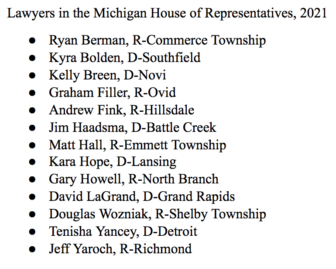By ERIC FREEDMAN
Capital News Service
LANSING – Where have all the lawyers gone?
Not to the Legislature – that’s for sure.
Despite the stereotype of a Capitol overrun with lawyers, the number of attorneys at the Capitol remains low, and the Senate now has none for the first time in state history.
The House has 13 lawyers – seven Republicans and six Democrats – among 110 representatives, a State Bar of Michigan tally shows, from about 46,200 lawyers in the state. Three of them graduated from Thomas M. Cooley Law School, a few blocks from the Capitol.
“Many left thriving private practices to serve in public office. By doing so, they bring their expertise in a broad range of legal areas — including criminal law, real estate, disability law, family law, and probate and estate planning — to the Legislature,” the Michigan Bar Journal reported.
In 2020, Peter Lucido, R-Shelby Township, was the only lawyer in the 38-member Senate. He gave up the seat after winning last November’s election for Macomb County prosecutor.
In 2017, while a member of the House, Lucido said in a Bar Journal article, “I’m begging for the lawyers that are out there — the judges, the prosecutors, the defense attorneys, everyone who has gone through the process of learning the law in the classroom — think about coming to the Legislature and lending a helping hand to the residents of this great state.
“We were given a very special gift when we became lawyers.”
Later this year, one of the 13 current lawyer-representatives, Douglas Wozniak of Shelby Township, could plug the Senate gap. He’s running in the special Republican primary on Aug. 3 to fill Lucido’s vacant seat.
The ranks of lawyer-lawmakers has been low in recent history: 15 in 2019, 13 in 2017 and 13 in 2015. In 2011 – 20 years ago – there were 17.

What’s the reason?
“It’s a bit of a mystery,” said Bill Ballenger, a political analyst who served in the Legislature in the late 1960s and early 1970s and now publishes the Ballenger Report, an online newsletter.
One factor may be term limits, Ballenger said.
For a young lawyer starting out, the prospect of a maximum three 2-year terms in the House may not be appealing because it takes away time needed to build a law practice, he said.
Another possible reason: Legislative seats may have lost their cachet as gateways to other elected positions such as judge or county prosecutor.
“At one time, lawyers did think being in the Legislature could get them some name ID if they’re wanting to run for a judgeship,” Ballenger said.
Still to be seen, he said, is whether the COVID-19 pandemic and the impending redrawing of district lines will make a difference in the number of lawyers running in 2022, when all House and Senate seats are up for grabs.
Lawyers still dominate the House Judiciary Committee, holding eight of the 13 seats. They include Graham Filler, R-Ovid, who chairs the panel, and David LeGrand, D-Grand Rapids, the top Democrat.
And they’ve controlled the governorship for the past 38 years with Democrats James Blanchard, Jennifer Granholm and Gretchen Whitmer and Republicans John Engler and Rick Snyder. Only Engler and Whitmer had previously served in the Legislature.
Meanwhile in Washington, D.C., the proportion of lawyers in Congress is far higher: 36.6% of the U.S. House and 53% of the U.S. Senate have law degrees, according to the Congressional Research Service. They include three members of Michigan’s congressional delegation: U.S. Sen. Gary Peters, D-Bloomfield Township, and U.S. Reps. Rashida Tlaib, D-Detroit, and Andy Levin, D-Bloomfield Township.